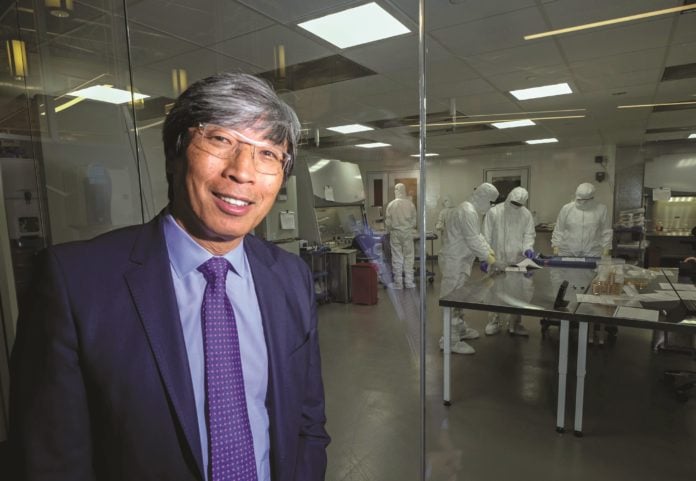The Covid-19 pandemic has put L.A.’s health care sector in an unprecedented spotlight.
The scores of hospitals providing critical care for L.A. County’s 10 million residents are now at the center of a financial storm. They have made extraordinary expenditures in the rush to prepare for a Covid-19 patient surge that so far hasn’t happened, all while seeing their most lucrative revenue stream of surgical procedures vanish for several weeks.
Meanwhile, L.A.’s scattered biomedical industry has coalesced around one goal: fighting the Covid-19 threat, either through new tests or treatments.
“Los Angeles is the epicenter of Covid-19 in California,” said John Romley, senior fellow with the Leonard Schaeffer Center for Health Policy and Economics at USC. “Our hospitals and medical professionals have worked very hard, joining together under extreme circumstances, to serve their communities effectively and humanely. And our biomedical researchers and innovators are helping L.A., the United States and the world to understand and solve this unprecedented challenge.”
Few exemplify the scope of L.A.’s fight more than billionaire biomedical entrepreneur Patrick Soon-Shiong.
On April 10, Soon-Shiong won bankruptcy court approval to buy the shuttered St. Vincent Medical Center in Westlake from bankrupt Verity Health System for $135 million.
Soon-Shiong said he would honor a lease agreement Verity had reached with the state to reopen the 366-bed hospital to treat Covid-19 patients. The hospital reopened two days later. Soon-Shiong said he plans to set up a coronavirus research facility on the hospital’s campus.
On the research and development side, Soon-Shiong has pivoted his family of biotech companies toward the fight. Two of those companies — publicly traded Nant-Kwest Inc. and privately held Immunity Bio Inc. — jointly announced April 14 that they were in discussions with the Food and Drug Administration about developing immunotherapy-based treatments and vaccines to combat Covid-19.
“We’re in a race against time, but I am confident that, as a result of the incredible hard work the NantKwest, ImmunityBio and the global scientific communities are undertaking, we will find effective therapeutics and vaccines against this coronavirus,” Soon-Shiong said in the announcement.
Many other efforts are underway in L.A. County, from the halls of UCLA and USC to the labs and offices of small companies, to come up with better tests and effective treatments for the disease.
“There are more Covid-19 countermeasures taking place now,” said Ahmed Enany, chief executive of the Southern California Biomedical Council, a downtown-based bioscience trade association.
Besides NantKwest and ImmunityBio, Enany cited efforts at Monrovia-based Xencor Inc., Westlake Village-based MannKind Corp. and Beverly Hills-based Capricor Therapeutics Inc. to develop effective treatments against Covid-19.
Other companies have plunged into the coronavirus testing arena, including Omni- Pathology Solutions Medical Corp. of Pasadena, Fulgent Genetics Inc. of Temple City, Proactive Diagnostics Inc. of Thousand Oaks, DxTerity Diagnostics of Rancho Dominguez and West Los Angeles-based MiraDX Inc.
And still other efforts are underway to reduce the cost of personal protective equipment. At UCLA, for example, Biodesign Fellow Glen Meyerowitz is working to develop a ventilator using parts from a home goods store that he hopes to eventually market for $1,000, roughly 2% of the current cost of a ventilator.
A lower-cost ventilator would certainly have come in handy across the UCLA campus at UCLA Ronald Reagan Medical Center, one of four hospitals in the UCLA Health system that had to spend more than $12 million in March and April to secure roughly 250 ventilators at nearly $50,000 apiece.
That was just one component of the tens of millions of dollars that the UCLA Health system had to spend to ramp up the number of intensive care units, ventilators and personal protective equipment to be prepared for an expected surge in Covid-19 patients that so far hasn’t materialized.
“We were rapidly paying whatever price we needed to pay,” said UCLA Health President Johnese Spisso.
Those expenditures were coming at the same time that revenue at hospitals across Los Angeles plunged an estimated 50% as nonurgent surgeries were banned to keep beds and intensive care units clear for Covid-19 patients, according to USC’s Romley.
“This financial crunch is unprecedented — I’ve never seen anything like it,” he said.
The ban on surgeries was lifted on April 22, but there’s no telling just how many patients will choose to schedule surgeries again as the pandemic rages. And hundreds of millions of dollars in federal relief dollars have poured into local hospitals though several hospital administrators have said the aid is too little to staunch the financial red ink.
As the war against Covid-19 drags on, hospital executives must also grapple with furloughing workers, cutting pay and other measures to try to keep costs in line.
“We’re expecting this battle and recovery process to go on for another six months to a year,” said Erik Wexler, chief executive for the Southern California division of Renton, Wash.-based Providence Health.
Keep reading the 2020 edition of the LA500.

